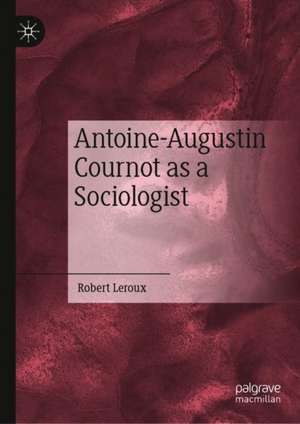Antoine-Augustin Cournot as a Sociologist
Autor Robert LeRouxen Limba Engleză Hardback – 18 ian 2019
Preț: 452.79 lei
Nou
Puncte Express: 679
Preț estimativ în valută:
86.64€ • 89.38$ • 72.30£
86.64€ • 89.38$ • 72.30£
Carte tipărită la comandă
Livrare economică 26 martie-09 aprilie
Preluare comenzi: 021 569.72.76
Specificații
ISBN-13: 9783030046866
ISBN-10: 3030046869
Pagini: 163
Ilustrații: XVII, 166 p. 1 illus.
Dimensiuni: 148 x 210 mm
Greutate: 0.38 kg
Ediția:1st ed. 2019
Editura: Springer International Publishing
Colecția Palgrave Macmillan
Locul publicării:Cham, Switzerland
ISBN-10: 3030046869
Pagini: 163
Ilustrații: XVII, 166 p. 1 illus.
Dimensiuni: 148 x 210 mm
Greutate: 0.38 kg
Ediția:1st ed. 2019
Editura: Springer International Publishing
Colecția Palgrave Macmillan
Locul publicării:Cham, Switzerland
Cuprins
Introduction. - Chapter 1: Context and General Ideas of the Book.- Chapter 2: The Necessity of History.- Chapter 3: Epistemological Issues.- Chapter 4: Action, Rationalism, and Social Change.- Chapter 5: The Study of the Social Milieu.- Chapter 6: Cournot and the French Sociological Tradition. - Conclusion
Notă biografică
Robert Leroux is Professor of Sociology at the University of Ottawa, Canada. He is the author of, among other publications, History and Sociology in France (2018), The Foundations of Industrialism (2016), and Political Economy and Liberalism in France (2012).
Textul de pe ultima copertă
The thinking of Antoine-Augustin Cournot has inspired a growing literature in economy and epistemology, but as of yet, his sociological thought has not been explicitly discussed and contextualized within the discipline. From the 1850s to the end of the 1870s, Cournot contributed significantly to the history of French sociology, particularly in the development of one essential idea: that forms of knowledge are intimately linked to the progress of reason. Philosophy, therefore, becomes interested in the development of the sciences, evolving as they do from the process of rationalizing human societies. Cournot’s comparative-historical sociology, “rediscovered” especially by Gabriel Tarde in the 20th century, seeks to understand how a macro-sociological trend can depend on the aggregation of a host individual decisions and actions, or to discern a certain order out of apparent chaos.
Caracteristici
Focuses on important French author and thinker of the 19th century through an historical and comparative approach Connects Cournot’s philosophical and epistemological thinking to the development of sociological theory and thought in the 20th century Bridges sociological theory and historical sociology with historiography and philosophy of knowledge
